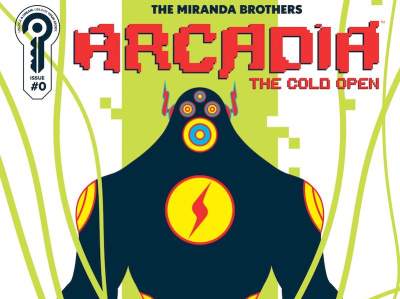Sharpening the Sword is a regular column by retailer John Riley of Grasshopper's Comics, a 1300 square foot comic and games store in
First of all, I'd like to thank everyone who has chimed in on the subject of pricing since my last article. We need to be having these discussions in our industry. Ultimately, part of the discounting discussion comes down to a question of personal philosophy, which I'm not going to debate. In last week's article I was really talking more about minimum pricing as a barrier to entry to the 'hobbyist turned basement retailer,' but since the topic has shifted more to discounting in general, I'd like to address some of the points made in today's comments, because I think that they open the door into a better understanding of discounting in general.
First off, Jay Bardyla makes a good point that managed pull and hold file systems are a good tool to gauge your customers' demand for titles. We've used some form of computerized subscription service for 15 years, and although some retailers feel that these pull and hold services allow your customers to visit your store less frequently, in our busy suburban area I feel that they are a necessary and welcome service to provide. And with so many new titles coming each month (in last month's Previews the first 22 of 24 DC titles were issues #1 or #2) we need all the help we can get in ordering as accurately as possible. But should we discount as well as provide that service for free? In my personal opinion (yours may differ), the answer would be no.
Discounting has become pervasive in our industry. This past week I spoke with representatives of three different POS systems for our industry. During each presentation one of the first points made by each was how flexible the system was in assigning discounts. I found it shocking that this was apparently a key selling point.
The argument to discount hinges upon the belief that the store cannot make the sale without a discount and/or will make up the lost profit in volume. Although this is a natural assumption, I personally don't believe that the numbers play out. I think the math is quite different than most people think.
Let's look at Paul's and Joe's situation. As Paul stated, he provides a 30% discount and Joe doesn't discount at all. Let's assume a flat 50% discount from the publisher and standard $2.99 comics. Paul states, '(Customers) can afford three of my comics versus (presumably) two of Joe's, and they buy three.' If this is the case, then on standard $2.99 books, Paul has made $1.80 in profit on his three-comic sale, while Joe has made $2.99 profit on his two-comic sale. Although Paul's sales are 50% higher than Joe's, his profit is actually 41% lower. In fact, Paul has to sell five books to make the same profit that Joe makes on two books. Paul has been in business for 23 years, and this is a choice that he's made and is happy with. It's just not one that I would make.
My biggest problem with this argument is that I just don't believe people will buy that much more simply because they are cheaper. Sure, people might buy a little more, and a few people might join the hobby who wouldn't otherwise, but I doubt they're going to increase their purchases by 150% as is necessary in the example above. How many times have you seen a customer come to the counter with one or two comics and comment that 'nothing good came out' that week? Honestly, if my customer has a $600 cell phone and is only picking up one book that week, it's because there's only one book out there that he is interested in reading, not because he can't afford another.
Let's look outside our industry for a moment. My wife and I sometimes go to a movie matinee as we have three kids and it's hard for us to get out at night. The matinee is roughly 40% less expensive than the nighttime show, but we've never thought, 'wow, it's so much cheaper, let's see two movies instead of one' or, 'I know this movie looks horrible but let's go see it because it's cheaper than normal.' Ultimately, I think the overwhelming majority of customers would purchase just about the same amount of books they would normally get and just grow accustomed to the discounted price.
Just for the record, for over a decade we offered a discount to all our club members with pull and hold lists at the store. But with overhead rising dramatically in our area we made the difficult decision a few years ago to end the discount. I was very nervous about what my customers' reactions were going to be. In the end, it turned out nobody really cared. Out of hundreds of customers we lost two; one of whom we had been expecting to leave for years due to personal problems, and the other came back in a few months anyway. It turned out that my customers weren't coming to me for the discount at all. In fact, some said that they were so happy with the store that they would be willing to pay more if it would keep us in business! The extra money went into continued store renovations, more aggressive ordering, more title diversification, and other amenities and services that made the store even more appealing to our customers, who were literally happier than ever.
Like Paul, one of my competitors initiated a huge discount. The result was a steady migration of his customers to our store. Surprised? A significant number of his customers actually left him to come to us and pay full price. Why? Because we offered better service and selection than he was able to provide at those margins. Quite a few times we heard, 'I don't care what it costs me, I just want to know I'm being taken care of properly.'
As I stated before, my original article was really addressing a separate issue-- the fact that fly-by-night discounters devalue our product (mostly on the gaming end) and that minimum pricing can help raise a barrier to entry. Paul pointed out that we exist in an open market with free competition...but do we really? Can any of us call up
Like you all, I love what I do for a living. I may have my bad days, but ultimately I get to do something I truly enjoy. But I also have responsibilities to myself, my family, my staff, and my customers to ensure that I am making a reasonable living and ensuring the long term health and sustainability of my business. At least for me, I've found that discounting does not factor into that equation.
So, if price isn't the all important factor here, what is? That's for next week.
The opinions expressed in this Talk Back article are solely those of the writer, and do not necessarily reflect the views of the editorial staff of ICv2.com.







